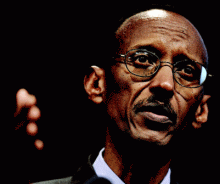Kagame To Launch Genocide, Holocaust Studies At University of Hartford�s Maurice Greenberg Center
Rwanda President Paul Kagame will on March 12 give a key address at the University of Hartford�s Maurice Greenberg Center for Judaic Studies to mark the launch of its Genocide and Holocaust Education Initiative.
Kagame will speak at 11 a.m. in Lincoln Theater about the future of his country in an address titled �Vision 20/20.�
The event is free and open to the public.
President Kagame is serving his second seven-year term as president of the East African nation.
In early 1994, Rwanda experienced what many feel was Africa’s worst genocide in modern times. Kagame sparked the genocide in April 1994 and then re-launched the Rwandan Patriotic Front (RPF) offensive that eventually defeated the weakened Rwandan �government in July, 1994.
The Maurice Greenberg Center�s new Genocide and Holocaust Education Initiative intends to preserve the memories of the Holocaust and genocides worldwide and help spread the lessons that need to be learned from them.
The initiative�s activities will include courses, workshops, public programs, exhibitions, and web-based projects.
According to a statement by Hartford University, the initiative will allow for the wide dissemination and distribution of materials for teaching about the Holocaust and genocide to educators in the Greater Hartford community and across the nation.
�Helping to advance this major new initiative will be Joseph Olzacki, who was recently named a special advisor on genocide and Holocaust education at the Greenberg Center. Olzacki brings more than 20 years of experience as an educator in Connecticut schools to the position.�
Olzacki has also received national attention for his innovative curriculum, the �Identity Project,� and has experience teaching about genocide prevention and strengthening student identities through the arts.
The Greenberg Center is also hosting a symposium at 3:30 p.m. that in Wilde Auditorium to celebrate the launch of its new initiative.
The symposium, titled �After the Trauma of the Holocaust and Genocide: Survival, Memorialization, and Reconstruction,� will bring together distinguished scholars from New England universities tol discuss genocide and Holocaust education.
President Paul Kagame, 54, was sworn in as President for a second seven-year term on Sept. 6, 2010.
Kagame, who was born in Rwanda�s Southern Province, fled with his family from pre-independence ethnic persecution and violence in 1960, crossing into Uganda where Kagame spent 30 years as a refugee.
In 1990, he returned to Rwanda to lead the Rwandan Patriotic Front�s (RPF) four-year struggle allegedly to liberate the country from the autocratic and divisive order established since independence.
Led by Kagame, the Rwanda Patriotic Army defeated the Rwandan government in July 1994 and the RPF subsequently set Rwanda on its current course towards nation re-building and socioeconomic development, although it has failed so far to bring reconciliation.
Kagame was appointed Vice-President and Minister for Defense in the so-called Government of National Unity on July 19, 1994, and four years later was elected Chairman of the RPF, a partner in the Government of National Unity. On April 22, 2000, Paul Kagame took the oath of office for the first time, after being elected by the Transitional National Assembly.
Ironically, despite his role in the Rwandan genocide in 1994 and in its furtherance in Congo after 1996, President Kagame has received a still surprising recognition for ‘his leadership’ (!) in peace building and reconciliation, development, good governance, promotion of human rights and women�s empowerment, and advancement of education and information and communication technologies (ICT).
The President is also widely sought after to address regional and international audiences on a range of issues including African development, leadership, and the potential of ICT as a dynamic industry as well as an enabler for Africa�s socioeconomic transformation.
For more than 20 years, the Maurice Greenberg Center for Judaic Studies has been a leader in Holocaust and genocide education through its annual workshops and exhibitions on Holocaust and genocide.
The statement issued by the University indicates �the new initiative will continue and expand upon these efforts and introduce an online site that will preserve the testimonies of second and third generation stories of genocide and the Holocaust and make them available to teachers worldwide.�
It’s not yet understood why a controversial figure like Kagame, who is still investigated for his role in the 1994 Rwandan Genocide and the Genocide against Hutus in the D. R. Congo as outlined by the United Nations DRC Mapping Report, has been chosen by the Universitiy to launch The Maurice Greenberg Center�s new Genocide and Holocaust Education Initiative on March 12, 2013.


0 comments
Kick things off by filling out the form below.
Leave a Comment